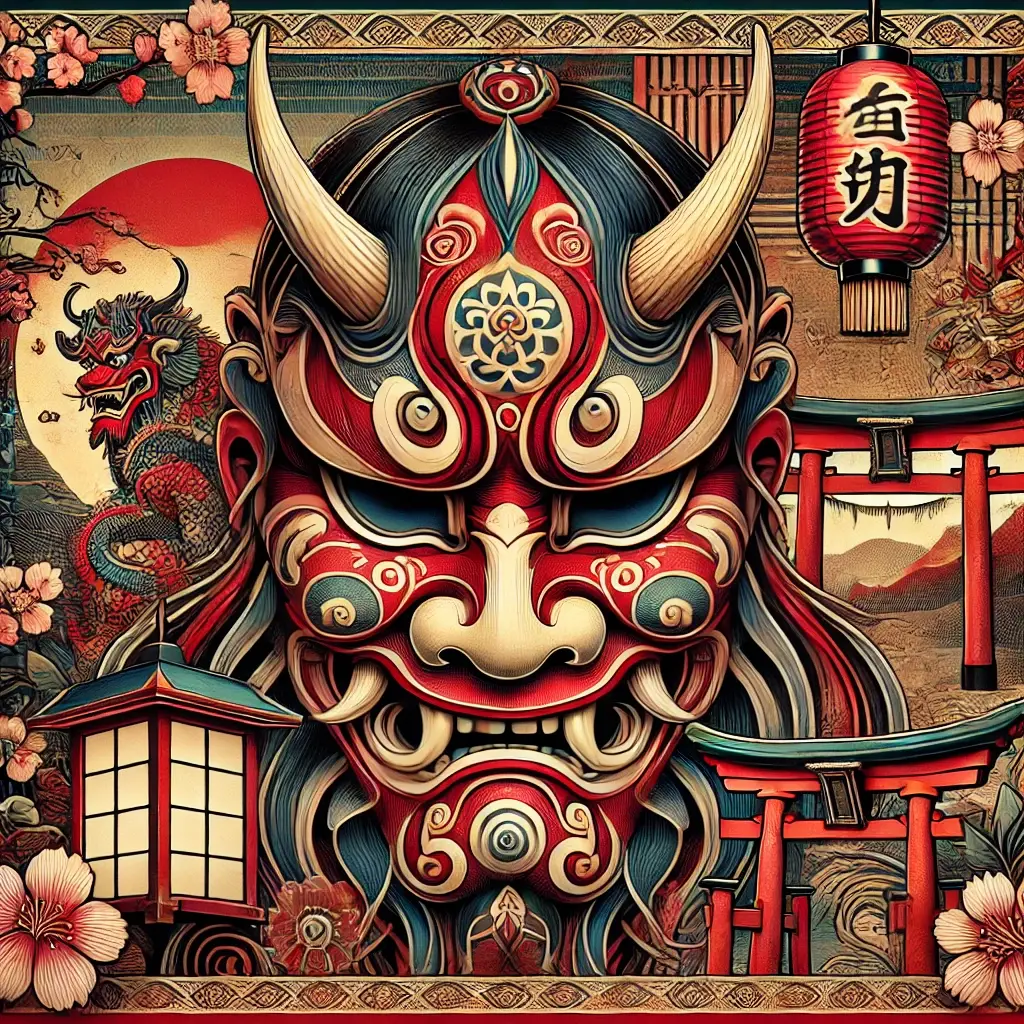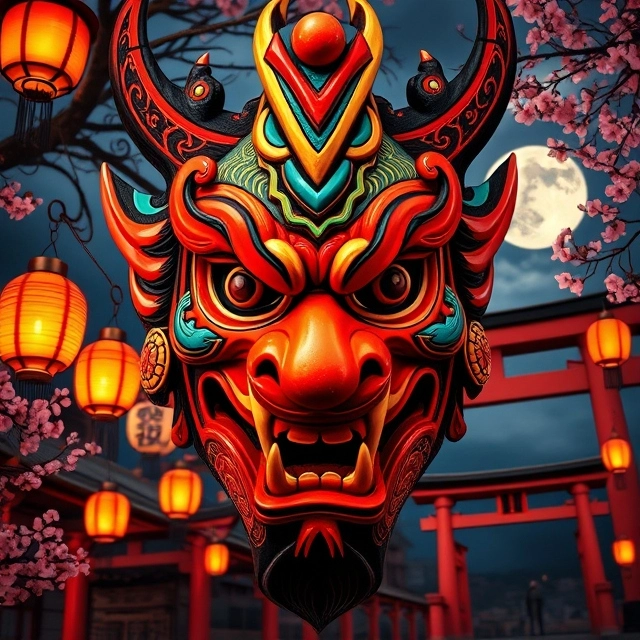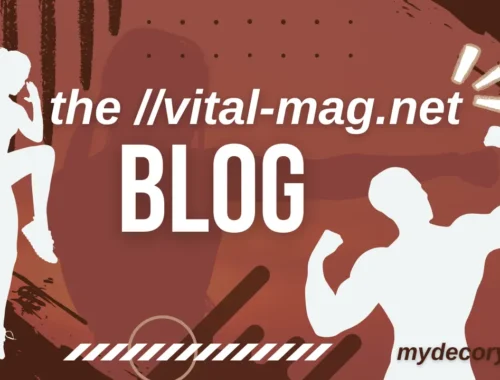
Japanese Masks for Protection
Table of Contents
ToggleJapanese Masks for Protection: Oni, Samurai, and Hannya
Masks have always had a special role in Japanese society, combining artistic expression, symbolism, and history. Japan’s rich mythology and spirituality are demonstrated by the frequent use of masks for protection and power in theater, festivals, and cultural rites. 7
With their respective connotations, the Oni, Samurai, and Hannya masks are the main protecting and potent masks. The significance of these masks, their historical evolution, and their influence on contemporary culture are all examined in this article.
Significance of Masks in Japanese Culture
Masks hold deep cultural significance in Japanese traditions, symbolizing spirituality, art, and history. They are central to Shinto rituals, Noh theater, and festivals, representing gods, spirits, or emotions. Iconic designs like Hannya, Oni and Samurai. Today, masks bridge ancient traditions with modern art, preserving Japan’s rich heritage.
Historical Roots of Japanese Masks
Japanese masks have their origins in the Buddhist and Shinto traditions of antiquity when they were worn to express deeper emotions or to empower or protect. Masks from the Oni, Samurai, and Hannya cultures represent spiritual protection, emotional metamorphosis, and fearlessness.
1. Oni Masks: Symbolism and Uses
Known for their ferocious and menacing appearance, oni masks are renowned icons in Japanese folklore that represent both protective strength and terrifying power.
The Meaning of Oni Masks
Perhaps the most famous Japanese masks for strength and defense are oni masks. Oni are ogres or demons that represent both protection and fury in Japanese folklore. They frequently have vicious faces, fang-like teeth, sharp horns, and vivid red or blue colors that represent strength and dread. Oni are regarded as bad spirits, yet they also act as guardians against more powerful evil forces.
How Oni Masks Represent Protection and Power?
The power of Oni masks to evoke dread and ward off evil spirits is their symbolic meaning. In order to attract strength into their life and protect themselves from negative energies, many people show or wear Oni masks. Oni masks are used during performances at traditional Japanese festivals in order to ward off evil spirits and safeguard local communities.
Modern-Day Uses of Oni Masks
Oni masks are now widely used as cultural symbols in addition to being used in rituals. Oni masks are associated with resilience and personal fortitude and are used for fashion, tattoos, and décor. They are also frequently seen during Japanese celebrations such as Setsubun, where people toss beans at those donning Oni masks in an attempt to ward off ill luck for the coming year.
2. Samurai Masks: Protection in Battle
Samurai masks were essential in Japanese warfare, designed not only for facial protection but also to instill fear in opponents, symbolizing the strength, honor, and resilience of the samurai warrior.
Origins of Samurai Masks in Japanese Warfare
Originally, samurai masks were a component of the armor that samurai fighters wore during combat. These masks, called Mempo, shielded the warriors’ faces and were frequently embellished with ferocious patterns to frighten adversaries. In addition to being useful in combat, they represented bravery and strength, representing the fortitude needed to defend one’s honor and clan.
Significance of Power and Fear in Samurai Masks
In order to give warriors an advantage in battle, samurai masks were made to inspire dread. Exaggerated facial features, snarling looks, or fanged mouths were common aspects of masks. Japanese masks for protection and power, such as samurai masks, had symbolic significance beyond their function in combat; they symbolized the samurai’s honor, devotion, and unwavering spirit.
Samurai Masks in Today’s Culture
Samurai masks are now cultural artifacts rather than battlefield gear because the samurai class has long since disbanded. Samurai mask designs are incorporated into contemporary fashion as symbols of strength and resiliency, while collectors and aficionados showcase them as icons of Japanese history.
3. Hannya Masks: Power of Emotion and Transformation
In Japanese culture, Hannya masks are potent symbols that symbolize strong emotional upheaval, change, and the intense energy of sadness and jealousy, transforming these feelings into a protective mechanism.
Origins and Symbolism of Hannya Masks
One of the most well-known Japanese masks for protection and authority is the Hannya mask, which represents a range of complicated emotions, especially retaliation and envy. The Hannya mask, which originated in Noh theater, depicts a woman whose strong emotions turn her into a monster. The mask, which represents the stronghold of strong emotions, is adorned with horns, sharp teeth, and a warped face that reflects inner anguish and grief.
Symbol of Intense Emotion as Protection
- The fierce expression of the Hannya mask, with its twisted, sorrowful features, represents intense emotions such as jealousy, anger, and heartbreak.
- This intense display is believed to act as a deterrent, scaring away negative energies and misfortune, making it a protective emblem.
Deflects Harmful Energies
- It is believed that by externally projecting negative emotions, the mask acts as a “shield” of protection, keeping harm or ill luck at bay.
- By channeling these emotions, the mask prevents negativity by turning them into external symbols rather than internalized sensations.
Confronts and Dispels Inner Fears
- A Hannya mask can be worn or shown as a symbolic means of facing one’s emotional challenges and concerns, transforming them into forces that can be confronted and conquered.
- This Hannya mask feature fosters emotional resilience by empowering people to freely confront and process their feelings.
Adds Layer of Emotional Resilience
- A common reminder of the power inherent in vulnerability is the Hannya mask. People might use the mask’s images to find the bravery they need to deal with challenging feelings or circumstances.
- It stands for resiliency, enabling people to accept and conquer the strong feelings it embodies.
The Hannya mask provides emotional strength and safety by externalizing these strong feelings, forging a strong bond with individuals who wear or exhibit it.
How Hannya Masks Are Used Today?
In modern times, the Hannya mask can be found in a variety of artistic mediums, such as jewelry, fashion, and tattoos. It is a potent subject for anyone who wants to convey emotional depth or personal transformation because of its twin connotations of beauty and dread. Because they may relate to the protective traits it symbolizes, many people find comfort in its images.
The Modern Appeal of Japanese Masks for Protection and Power

Used extensively in art, fashion, and popular culture today, Japanese masks for protection and power have transcended their traditional origins and gained contemporary appeal as emblems of strength, artistry, and cultural expression.
Japanese Masks as Art and Fashion
Japanese masks, particularly those worn by Oni, Samurai, and Hannya for protection and power, have become more than just traditional accessories. Because of their striking expressiveness and profound symbolic meaning, artists from all over the world use these designs in their paintings, sculptures, and installations. They are also well-liked in the fashion industry, where their designs serve as inspiration for tattoos, apparel, and accessories.
Japanese Masks in Popular Culture
Japanese masks are well-known throughout the world of media, having been used in anime, video games, and films to represent everything from bravery to internal strife. These masks continue to enthrall audiences as representations of mystique and cultural history, exposing younger generations to Japanese ideals and mythology.
Choosing Japanese Masks for Protection and Power
Choosing Japanese masks for protection and power entails being aware of their rich cultural importance and symbolism, which enables people to relate to the traits of fortitude, resiliency, and emotional depth they stand for.
Selecting the Right Mask for Symbolism and Style
It’s important to take into account each Japanese mask’s own symbolism while choosing them for protection and strength. Here is a summary to help you make your decision:
Identify the Desired Trait for Personal Empowerment
- Oni Mask:Perfect for people who wish to focus their strength and bravery, particularly when confronted with challenges. The Oni mask stands for a strong force that triumphs over hardship.
- Samurai Mask:Ideal for people who respect honor, loyalty, and tenacity. The Samurai mask represents valor and a warrior’s spirit.
- Hannya Mask: The Hannya mask symbolizes emotional fortitude and self-confrontation for anyone undergoing emotional difficulties or pursuing change.
Connect with Personal Beliefs or Aesthetic Preferences
- Each mask has its own visual attraction in addition to its own symbolic meaning. Based on your emotional attachment to the mask’s meaning and artistic style, make your choice.
- Whether it’s conquering phobias (Oni), remaining resilient in the face of conflict (Samurai), or managing intense emotions (Hannya), people frequently select a mask that corresponds with their current life journey.
Consider Cultural Significance and Impact
Recognize that these masks have deep cultural significance in addition to being representations of individual strength. Respectfully embracing their symbolism strengthens the bond with Japanese ancestry.
Where to Find Authentic Japanese Masks for Protection and Power?
Japanese art galleries, online retailers, and specialty cultural stores sell authentic Japanese masks for protection and power. Choose masks made by traditional craftspeople who uphold ancient methods for the best quality, guaranteeing authenticity and cultural integrity. We provide a carefully chosen assortment of authentic Oni, Samurai, and Hannya masks at Japanese Oni Masks, each one expertly produced with attention to detail and cultural history. Look through our selection of Japanese Masks Store to choose the ideal mask that suits your symbolic requirements and personal taste.
The use of Japanese masks for protection and authority has a long history and is ingrained in Japanese society. These masks represent strength, resiliency, and the capacity to face both internal and external obstacles, whether they are used in theater, traditional festivals, or contemporary art. By embracing these symbols, individuals can connect with a rich heritage, finding meaning and strength in their own lives through the powerful imagery of Oni, Samurai, and Hannya masks.
FAQs: Japanese Masks for Protection
What does the Japanese mask mean for protection?
The Tengu mask, which was historically associated with evil, fear, and war, is now frequently worn at Shinto festivals, Noh theater, and manga as a sign of wealth and protection. Since the Tengu are renowned to ward off evil spirits, this mask, which features a crimson visage and a large nose, does, in fact, symbolize their protective qualities.
What is the oni mask used for?
Oni masks, which have terrifying faces with pointed horns and fangs, stand for strength, power, and defense. Oni masks exist in several varieties, including Hannya (a jealous female demon), Kabuki (mythical creatures/animals), and Noh (human faces), and are used in rites and festivals like Setsubun to ward off evil.
What do Japanese masks symbolize?
Japanese culture is well known for its fascinating and varied masks, each of which has a special meaning. Among the most famous masks are the terrifying Hannya, which stands for anger and jealousy; the placid Noh masks, which symbolize a range of emotions; and the humorous Tengu masks, which portray mythological animals.
What do Japanese say about 3 masks?
The Japanese say that you have three faces. You show the world your first face. You show your close friends and family the second face. You never reveal your true self to others.
What is a kabuki mask?
Kabuki masks are used to depict a variety of characters in kabuki theater; they are extremely elaborate and have exaggerated features. One of the most recognizable components of kabuki theater are the masks, which are frequently colored to represent different aspects of the characters they represent
You May Also Like

Exploring the //vital-mag.net blog: In-Depth Review and Insights
27 October 2024
How Often Should You Schedule Aircon General Service?
4 January 2025

